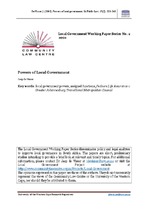| dc.contributor.author | de Visser, Jaap | |
| dc.date.accessioned | 2014-10-24T12:07:02Z | |
| dc.date.available | 2014-10-24T12:07:02Z | |
| dc.date.issued | 2002 | |
| dc.identifier.citation | de Visser, J. (2002). Powers of local government. SA Public Law, 17(2): 223-243 | en_US |
| dc.identifier.issn | 02586568 | |
| dc.identifier.uri | http://hdl.handle.net/10566/1274 | |
| dc.description.abstract | The Constitution recognises and makes provision for three levels of government that derive their powers from the Constitution. The constitutional status of a municipality, as part of the third sphere of government, is thus materially different from what it was when Parliament was supreme. Under the parliamentary sovereignty, the institution of elected local government could have been terminated at any time by the central or provincial governments. The judgement, delivered by the Constitutional Court in Fedsure Life Assurance and Others v Greater Johannesburg Transitional Metropolitan Council and Others1 forms the bedrock of any analysis of local government’s powers. It was in this case that the Constitutional Court made an unequivocal statement as to the status of local government in the post-1994 constitutional framework. | en_US |
| dc.language.iso | en | en_US |
| dc.publisher | UNISA Press | en_US |
| dc.rights | Copyright Unisa Press. Permission granted to reproduce the journal article in this Repository. | |
| dc.subject | Local government powers | en_US |
| dc.subject | Assigned functions | en_US |
| dc.subject | Fedsure Life Assurance v Greater Johannesburg Transitional Metropolitan Council | en_US |
| dc.title | Powers of Local Government | en_US |
| dc.type | Article | en_US |
| dc.privacy.showsubmitter | false | |
| dc.status.ispeerreviewed | true | |
| dc.description.accreditation | Department of HE and Training approved list | en_US |

